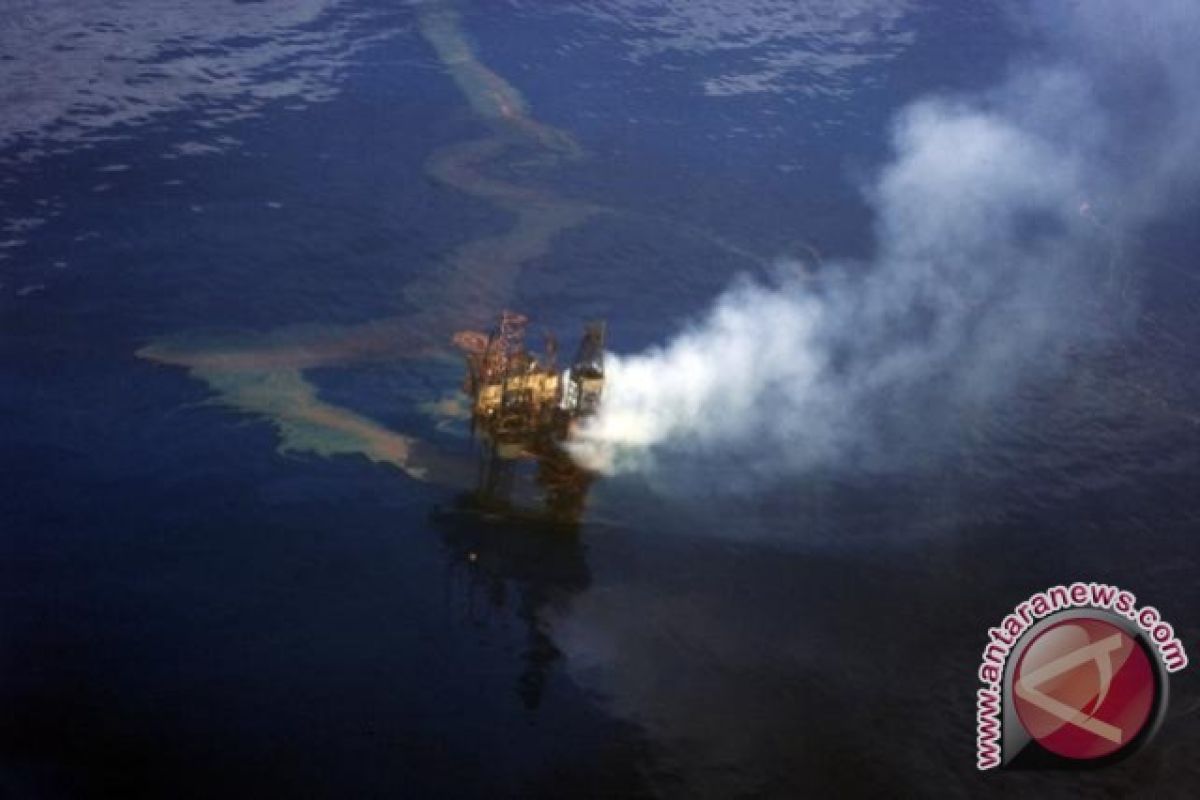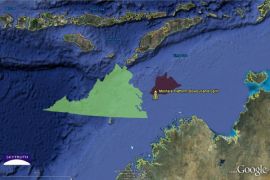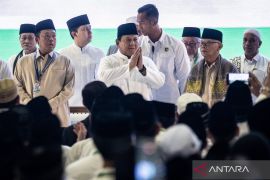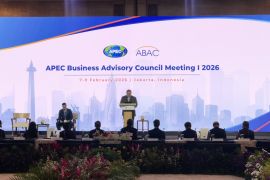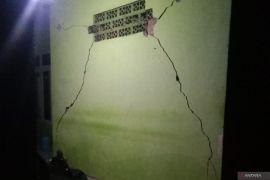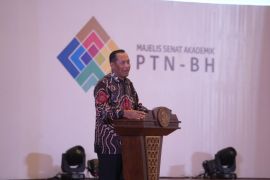An explosion that occurred in the Montara oil field on August 21, 2009 caused an oil pipe to burst and the resulting oil spill to contaminate the Timor Sea.
Following the incident, fishermen in Oesapa in the district of Kupang, East Nusa Tenggara, found thousands of dead fish floating in the Timor Sea.
During August-November 2009, the Montara well leaked uncontrollably for more than 70 days, destroying fish stocks in Indonesian territory.
As a consequence, 40 million liters of crude oil were released into Australian waters and eventually into Indonesian waters. Some 70,341.76 square kilometers of the Timor Sea part of which borders on NTT province was polluted.
In mid-January 2010, the leak was finally plugged and secured permanently. However, during the first year of the Montara oil spill-triggered pollution, fish catches from Timor Sea waters dropped 80 percent.
East Nusatenggara fishermen`s incomes dropped drastically due to the polluted condition of the sea, Mustafa, chairman of the Timor Sea Traditional Fishermen`s Alliance, said in Kupang, last June.
In NTT, some 7,000 traditional fishermen and more than 10,000 coastal communities rely on the Timor Sea and seaweed cultivation for a living.
Thousands of coastal residents in NTT have been affected by the oil spill as their traditional fishing waters became contaminated by lead (plumbum) from the crude oil and by the toxic chemical Corexit 9500 used by Australian maritime authorities to disperse the oil spill.
A doctor from the Yayasan Peduli Timor Barat (West Timor Care Foundation - YPTB) Hermanus Man recently said a rare disease suspected to be caused by the impact of Montara oil spill had infected a number of local fishermen.
Most of the fishermen experienced skin inflammation and swelling on their neck, after they had dived for sea cucumbers and other deep water fishes in the Timor sea.
The foundation`s chairman Ferdi Tanoni suspected that the rare disease was caused by toxic substance dispersant, Corexit 9500, used by the AMSA (Australian Maritime Safety Authority) to submerge the oil spill into the sea bed.
Since the beginning of the Montara tragedy, the foundation has been actively requesting both Indonesian and Australian governments to conduct proper scientific , thorough, credible, comprehensive, transparent and independent studies of the oil spill impacts.
The studies should cover three main areas namely its impacts on social life on the society, public health and the environment, he said.
Tanoni said the failure of the two governments and PTTEP Australasia, the operator of Montara oil field in Timor Sea, to mitigate the tragedy caused by the oil spill was a crime against humanity in West Timor, NTT.
To deal with the Montara oil spill, the government set up a National Team for Emergency Mitigation of Oil Spill in Sea. The team`s chairman is the transportation minister and the deputy chairman is the environment minister.
The team has conducted negotiations with Thailand`s PTTEP Australasia following the oil spill caused by the company`s Montara oil field in Timor Sea waters.
The Indonesian government had earlier demanded $2.4 billion in compensation for the pollution in the Timor Sea. The Indonesian government had calculated the direct losses suffered by local fishermen by the oil spill`s polluting effect, the general economic losses, as well as the indirect losses from the damage done to coral reefs, mangroves and coastal ecosystems.
After initially rejecting the compensation demand, PTTEP Australasia was reportedly willing to compensate the fishermen partly.
But the signing of the MOU on the compensation realization has been delayed several times as PTTEP cited several excuses, including the general elections in Thailand and the prolonged floods.
"About 3,000 fishermen in Kupang and Rotendaou, East Nusa Tenggara, will get compensation because of the oil spill", Masmelyarti, the deputy environmental affairs minister in charge of toxic waste management, said in Denpasar, Bali, November 2011.
The MOU on the compensation would be signed after the Thai government had successfully tackled the floods in Bangkok, she added.
Earlier, the MOU had been scheduled to be signed in Jakarta on August 3, 2011, with the compensation payment estimated to reach around three million US dollars or roughly Rp27 billion, instead of 2.4 billion US dollars as initially demanded by Indonesia.
But the company had postponed the plan to sign the MOU with Indonesia, with an excuse that the swearing-in of Thailand`s new cabinet took place on the same day with the plan to sign the MOU.
"The signing of the MOU is delayed until late August 2011," Head of the East Nusa Tenggara (NTT) Environmental Agency (BLHD) Alexander Oematan said early August, adding that PTTEP wanted a Thai government`s representative to be present during the signing of the MOU in Jakarta.
Later, August 29, 2011 was set as the new date for the MOU signing, but it was eventually delayed again to September 6, 2011. And now it has been postponed once again until a still uncertain date.
"The signing of the agreement was delayed because there was a change in the Australian energy and mineral resources minister`s post but we are now asking that the accord be signed soon," the then Environmental Affairs Minister Gusti Muhammad Hatta said last September.
The amount of the compensation seemingly is still being disputed by the Indonesian government and PTTEP Australasia.
According to Mohammad, the figure Indonesia had forwarded as compensation for the impact of the Montara oil spill was rejected by Australia on the ground it was too high.
PTTEP planned to make up for Indonesia`s losses through its corporate social responsibility (CSR) program and had told journalists and non-governmental organizations (NGOs) it would thereby be compensating Indonesia.
"However, that is unacceptable to us because there is a difference between CSR and damages," Hatta said, insisting that the compensation must be given separately from CSR funds.
Meanwhile, Freddy Numberi, the then transportation minister, said PTTEP Australasia was offering CSR funds worth between one and three million US dollars, whereas the Indonesian government had asked for five million US dollars.
"They had previously offered three million US dollar, but in the seventh meeting today (March 11, 2011), agree to pay five million US dollars. The amount is not part of our total claim of 2.4 billion US dollars or around Rp23 trillion," Numberi said last March.
Reacting to the information, Ferdi Tanoni in Kupang, NTT, in March 2011, protested saying that the five million compensation was an insult for NTT people who have become victims of the oil spill.
"The NTT people have been described by Jakarta as third class people, so the compensation equals tthe price of a slice of bread," Tanoni said, adding that given the large area affected by the pollution, the compensation claim should be around Rp100 trillion (around 11 billion US dollars).
Another year has passed and the promises for compensation have not been met. Although Masmelyarti last month said 3,000 fishermen would be compensated, she did not give any date of the implementation.
A German proverb says promises are like the full moon, if they are not kept at once they diminish with ever passing day.
(T.F001/HAJM/A014)
Reporter: by Fardah
Editor: Priyambodo RH
Copyright © ANTARA 2011
